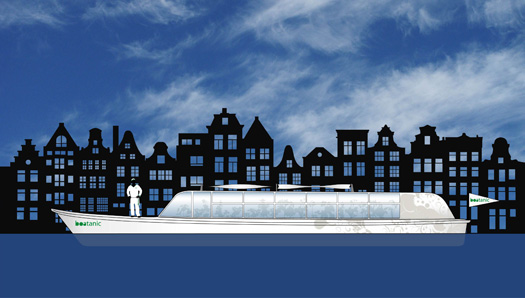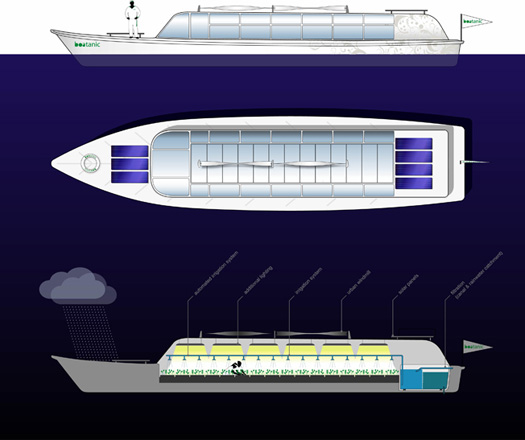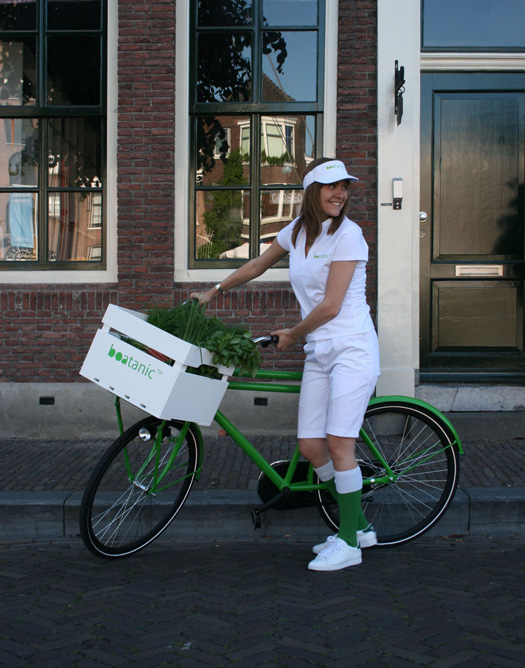
Boatanic's name evokes "botanic" and Titanic in an allusion to both local produce and environmental catastrophe. Renderings and photo: Damian O'Sullivan.
Picture a tourist boat in the canals of Amsterdam. Huge panels of glass form the roof and walls of the single cabin, allowing passengers a clear view of the passing cityscape. But what struck designer Damian O’Sullivan on a stroll through the city wasn’t the boats’ functional elegance: it was their potential as a floating greenhouse. Why not strip the fittings from a disused boat to create a waterborne market garden growing fresh organic produce for sale to inner-city customers? The scheme would minimize food miles, bring business back to the canals and help to promote a healthy lifestyle. Says O’Sullivan: “When people see the concept they wonder why it hasn’t happened before.”
His inspiration mixes commerce with ideology. Through the year the Boatanic will grow some 1,100 pounds of seasonal herbs, fruits and vegetables. As space is tight — the standard tourist boats are just 66 feet long — he’ll focus on a limited range of smaller specialty produce that can be sold at high margins. Larger vegetables, such as cabbages or potatoes, will be supplied from a waterside depot on the edge of town that also provide Boatanic’s night-time berth and refueling point. “To succeed, you need a business model that will really work,” says O’Sullivan, who runs a design business in Rotterdam.
Picture a tourist boat in the canals of Amsterdam. Huge panels of glass form the roof and walls of the single cabin, allowing passengers a clear view of the passing cityscape. But what struck designer Damian O’Sullivan on a stroll through the city wasn’t the boats’ functional elegance: it was their potential as a floating greenhouse. Why not strip the fittings from a disused boat to create a waterborne market garden growing fresh organic produce for sale to inner-city customers? The scheme would minimize food miles, bring business back to the canals and help to promote a healthy lifestyle. Says O’Sullivan: “When people see the concept they wonder why it hasn’t happened before.”
His inspiration mixes commerce with ideology. Through the year the Boatanic will grow some 1,100 pounds of seasonal herbs, fruits and vegetables. As space is tight — the standard tourist boats are just 66 feet long — he’ll focus on a limited range of smaller specialty produce that can be sold at high margins. Larger vegetables, such as cabbages or potatoes, will be supplied from a waterside depot on the edge of town that also provide Boatanic’s night-time berth and refueling point. “To succeed, you need a business model that will really work,” says O’Sullivan, who runs a design business in Rotterdam.

Plan and elevation views of the vessel.
Every day the boat will moor on a different stretch of the waterways, alerting would-be customers to its location through an iPhone app or its website. Not that O’Sullivan will depend only on quayside trade. He also aims to supply restaurants and private subscribers who will take a regular boxed selection of produce. Naturally, in cycling-friendly Holland, the Boatanic’s crew — O’Sullivan has already designed chic green and white uniforms — will deliver orders by bike.
But the project is infused with O’Sullivan’s own eco-concerns. The name itself — a fusion of botanic and Titanic — is intended as a reminder of the risk of environmental catastrophe. His design practice in Rotterdam places heavy emphasis on applying ideas of sustainability — his best-known creations include a solar lamp, powered both by sunlight and LED bulbs for use either in the house or in the garden — and he’s keen to use the Boatanic to push the cause. “This is partly about growing food, partly about raising awareness and partly about education,” he says.

In O'Sullivan's scheme, the crew will deliver produce by bike in specially designed uniforms.
In practical terms, that will mean organizing visits by local schoolchildren to study how food is produced, and employing the latest energy efficient growing technology. The Boatanic team is now looking at rainwater catchment and filtration systems, the possible use of solar and wind power, and exploiting smart materials for retaining heat by night. Recycled frying fat from neighborhood restaurants could provide the boat’s fuel.
Funding has still to be finalized — O’Sullivan is looking for sponsorship from the Amsterdam authorities — but he hopes that Botanic will take to the water within 18 months. And if the project succeeds in Amsterdam, why not other cities? All that’s needed, says O’Sullivan, is a temperate climate, consumers with a taste for locally grown produce and a convenient stretch of waterfront. What works for Amsterdam could work as well for Seattle or Sydney.


Comments [2]
07.08.10
02:21
07.15.10
12:52